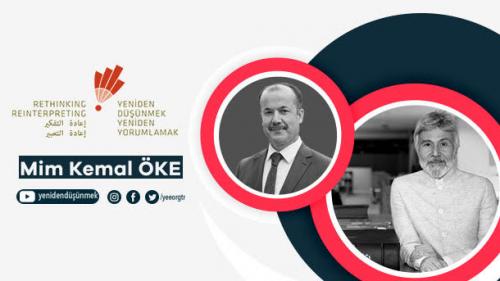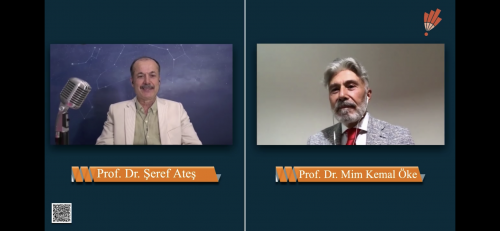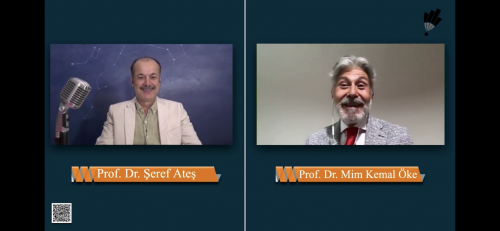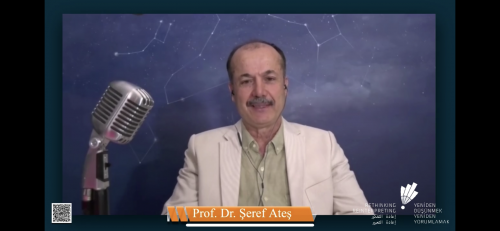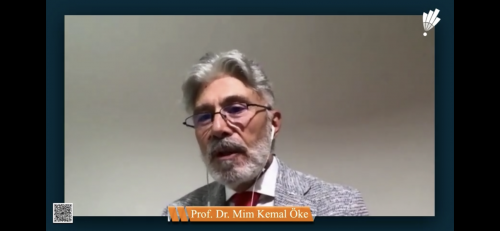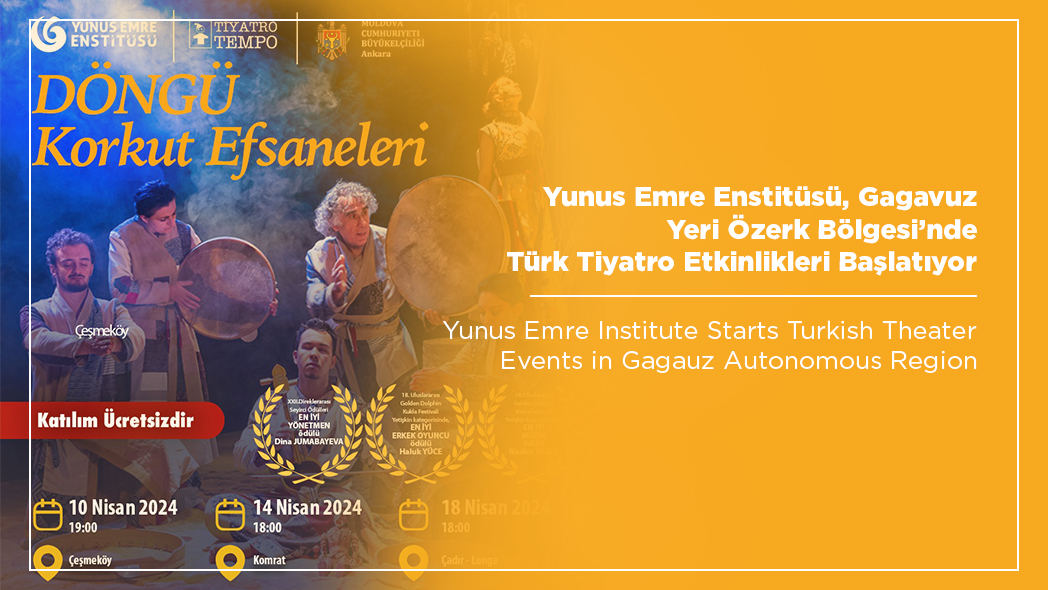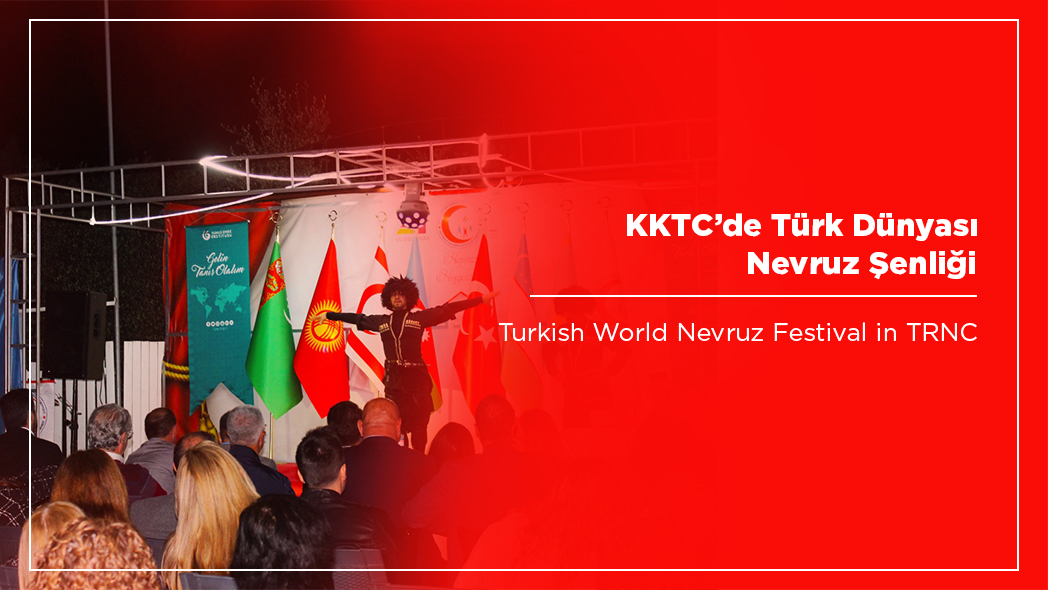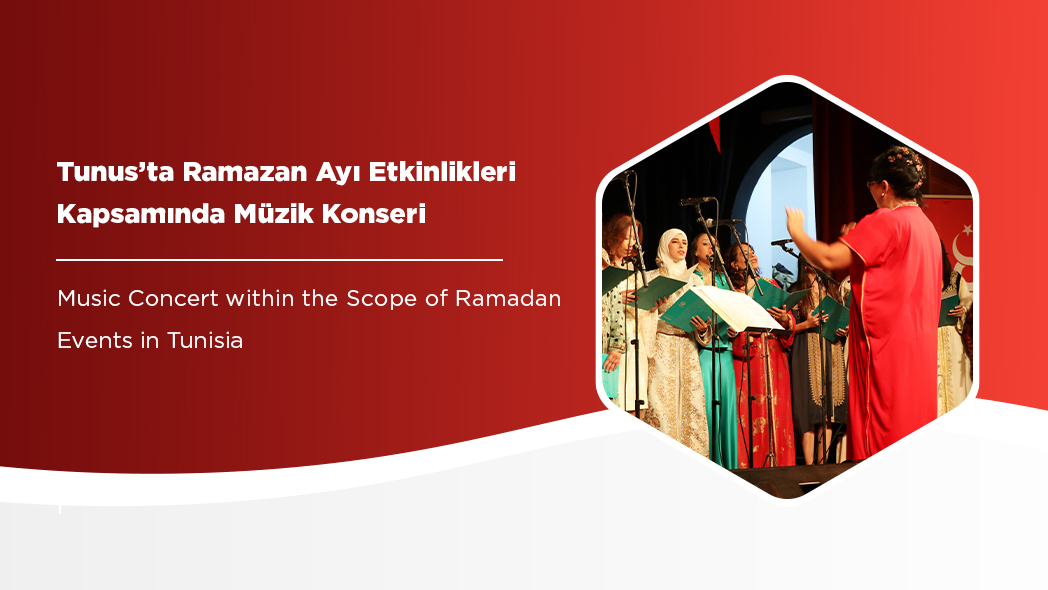Rethinking, Reinterpreting: Prof. Dr. Mim Kemal Öke
Yunus Emre Institute has hosted Prof. Dr. Mim Kemal Öke, known for his work in political science, at new episode of the "Rethinking, Reinterpreting" program. During the program, moderated by Yunus Emre Institute President Prof. Dr. Şeref Ateş, the spiritual voyage of humanity in the wake of the novel coronavirus pandemic wreaking a havoc around the world, the impact of Sufism in Anatolia, true love, human relations, ancient wisdom, culture and art, and many other topics were discussed. "Ancient wisdom, be it in Tibet or any part of the Far East or the remotest village of Africa, says that people are friends of each other. People will be happy by helping each to eat something, not by eating each other," Prof. Dr. Mim Kemal Öke said.
Yunus Emre Institute President Prof. Dr. Şeref Ateş hosted Prof. Dr. Mim Kemal Öke at his program "Rethinking, Reinterpreting," held on Wednesday, June 17. Humanitarian values re-appreciated by all human beings during the coronavirus outbreak, Sufism, how the Western philosophy saw life and man, particularly after the French Revolution, competition and fellowship, and many other topics were discussed in detail.
"There is a Sufism-based dimension to your interviews, talks and other initiatives in recent years. As our audience include people from all around the world, not only from Turkey, how do you think that this Sufism-based dimension, unique mostly to Anatolia, affect individual and social lives?" was Prof. Dr. Şeref Ateş's first question. Mim Kemal Öke replies as follows:
At a time when everything is treated like 'fast food', certain values should be preserved without degeneration." |
It is hard to imagine the Turkish history, and especially, the Turkish-Islamic civilization, without Sufism. The teachings, stance and ideas, dating back to Khoja Akhmet Yassawi, and represented by Yunus Emre, whose ideas are central to your Institute, are our true character. They are not only our national pride, but also our spirit, an important perspective on life, shaping our body and mind, and crucial in terms of morality and upbringing. This is how I see it: with your permission, Sufism is a matter of acquiring ethical and aesthetic values. In other words, it is an institution taking human beings from meanness to grace. In the 21st century, we see, everything is degenerated and turns into something that is loathsome. It is hard to maintain quality amid all this. In other words, I do not say it as denigration, but at a time when everything is treated like 'fast food', certain values should be preserved without degeneration."
SUFISM CHANGES ALL BEHAVIORS IN THEIR ENTIRETY
Prof. Dr. Öke: Sufism is actually a matter of getting civilized, in a word. Of course, it has emerged from Islam, but non-Muslims or unbelievers should have important inferences to make from it as well. |
Prof. Dr. Öke noted that the Sufi tradition is influential over many types of behaviors such as eating, studying, or addressing other people. "So it follows that Sufism is actually a matter of getting civilized. Of course, it has emerged from Islam, but non-Muslims or unbelievers should have important inferences to make from it as well. In this quest for getting civilized, Rumi stressed, 'My dervishes should have sound minds, pleasures and hearts'. So, there is the matter of peace in Sufism. There is also the matter of love," he said.
CORONAVIRUS WAS AN EYE-OPENER FOR THE HEARTS OF PEOPLE
Prof. Dr. Öke: If it were not the coronavirus outbreak, human beings would not focus on this blue marble so intently. As long as they understand each other's problems, the people suffering from the same problems should know how to engage in a sharing, and share each other's problems, understand each other and unite in pride. |
Prof. Dr. Öke underlined that the coronavirus pandemic has urged human beings to unite on a global level, describing the spiritual gains of this period for humanity as follows: "If it were not the coronavirus outbreak, human beings would not focus on this blue marble so intently. As long as they understand each other's problems, the people suffering from the same problems should know how to engage in a sharing, and share each other's problems, understand each other and unite in pride. Therefore, Sufism is one of the major paths to civilization and love individually, collectively, globally, nationally or internationally. As you frequently stress, Yunus Emre asks: Why have we come to this world? To love. A person who loves will embrace other people and try to do good things."
'MY DAUGHTER LED ME TO ART'
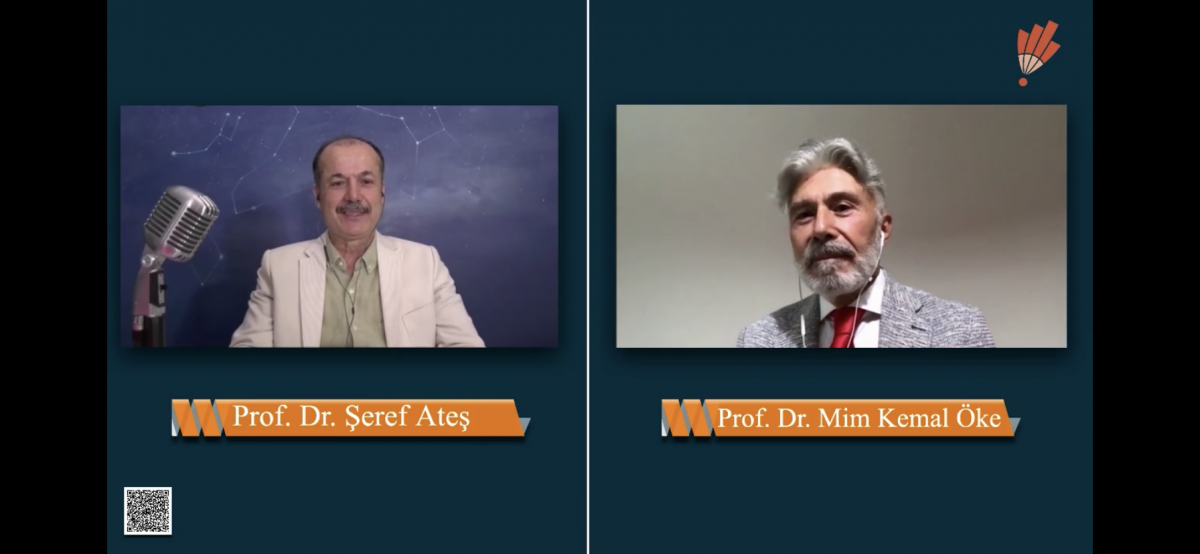 Prof. Dr. Öke pointed out that he has always nurtured ideals for the betterment of Turkey and the world since his young ages. "As I was in favor of peace, I worked at the United Nations and studied international relations. This was the result of my approach which sought to embrace everyone and unite the world. This is the result of a love-based approach," he said. Noting that they made use of music in providing education to his daughter with Down's syndrome and, in this process, he developed affinity with music, Prof. Dr. Öke said: "My interest in culture and art was thanks to my daughter. My daughter was born with Down's syndrome and we have invested greatly in her training. However, she eventually got into depression because society was reluctant to accept her. So she turned in on herself. They told us that artistic therapy would do good; she would benefit from musical therapy. I have never played even a harmonica in my life. But, I can now play battery very well."
Prof. Dr. Öke pointed out that he has always nurtured ideals for the betterment of Turkey and the world since his young ages. "As I was in favor of peace, I worked at the United Nations and studied international relations. This was the result of my approach which sought to embrace everyone and unite the world. This is the result of a love-based approach," he said. Noting that they made use of music in providing education to his daughter with Down's syndrome and, in this process, he developed affinity with music, Prof. Dr. Öke said: "My interest in culture and art was thanks to my daughter. My daughter was born with Down's syndrome and we have invested greatly in her training. However, she eventually got into depression because society was reluctant to accept her. So she turned in on herself. They told us that artistic therapy would do good; she would benefit from musical therapy. I have never played even a harmonica in my life. But, I can now play battery very well."
When Prof. Dr. Şeref Ateş asked: "The ability to think positively, smile at all times and leave the life to its own course is not something that can be acquire with exact knowledge or academic knowledge. I mean, the proponents of Sufism or religion are many. But, its practitioners are very few. Why would you suggest, in this regard, for people both in Turkey and around the world? That is, how can this model positive thought be disseminated?" Prof. Dr. Mim Kemal Öke replied as follows:
"You have put it very nicely. What was the contribution of Nazlı or musical therapy to my development? For one thing, there is the rediscovery of our ancient tradition. Actually, this ancient wisdom exists in all societies. I mean, therapies using arts or music exist in all cultures. It is a tradition which Turks brought from Central Asia. There were shamans and Dede Korkuts. They would heal people. When you visit anywhere in Anatolia, you will come across to the Houses of Remedy (hospitals) in the Ottoman or Turkic geography. There are therapy houses. They would employ a holistic approach to treatment. The world is just beginning to adopt this approach. Yes, but there is also the development that occurs thanks to science. This is achieved through doubts. Tests are performed, and hypotheses are tested; models, paradigms, etc., are developed and tested. At some point, you are stuck. When you are stuck in that manner, it is the intuition which will open up your insight. In our world, we would refer to it as wisdom, training and upbringing in that past or we would call it knowledge and learning. Who acquires learning? First, you become a scholar, and then, you become a wise man, and then, you become a lover (of God). When you become a lover, God gives part of His knowledge to that person."
A SEARCH FOR A WORLD WITH SPIRITUAL DEPTH HAS STARTED
Prof. Dr. Ateş: We, as human beings, are born to this world as the caliphs of God because we are superior to angels for being able to make sense of objects. This applies to Christianity as well. That is, it applies to the philosophy of Christianity as well. However, we are left out in the cold because we relegate all that domain of meanings to objective science and rationalist science. |
Prof. Dr. Mim Kemal Öke stressed that the matters which could not be named scientifically and which appealed to human spirit had come to the fore in post-coronavirus outbreak era. "We are beginning to realize that a person without any metaphysical depth cannot be happy with his/her life or make sense of the world or himself/herself. So, we have to rediscover human spirit," he said.
Noting that there are some 1,000 definitions of culture, Prof. Dr. Ateş indicated that the human ability to name things is particularly important for making sense of the world. "The most important of these can be found in our culture or overlaps with the tradition. In the Qur'an, there are verses about creation by God. When angels are asked to give the names of objects, angels fail to give their names, but man can. What does knowing the names mean? It is to make sense of them. That is, we, as human beings, are born to this world as the caliphs of God because we are superior to angels for being able to make sense of objects. This applies to Christianity as well. That is, it applies to the philosophy of Christianity as well. However, we are left out in the cold because we relegate all that domain of meanings to objective science and rationalist science."
THE EGO SHOULD BE TAMED, NOT TO BE SUPPRESSED
Prof Dr. Mim Kemal Öke made a comparison of Sufism and the Western philosophy in terms of their views on the ego. Prof. Dr. Öke noted that unlike the Western philosophy, Sufism seeks to discipline the ego, and explained the perspectives of both worlds regarding the ego:
"There is a film called 'The Man in the Iron Mask'. It is a novel by Alexandre Dumas. There, the protagonist wears an iron mask. He has a twin brother. King Louis 14: one is a bad guy and the other is the good guy, like Cain and Abel. In time, they were replaced and the good guy was imprisoned and there, his face was covered. He was the Man in the Iron Mask. So, it can be suggested that every human being has a twin sister or brother. That twin sister or brother is the carnal self, bothering you. There is your soul on one side and your carnal self on the other. There is your heart on one side and your devil on the other. Both live in the same space inside man. But this is a challenging neighborhood within the same house. The Westerners call for suppressing this ego. However, the Sufists who have an organic world view and who are God's friends believe that this heart can be mended with love, i.e., the carnal self can be disciplined. They assume that the carnal self can be tamed so that it can turn into stations giving dynamism to man. Then, human beings can overcome the evil commanding self and question themselves. After they question themselves, they start to receive inspirations or intuitions from God."
'MAN IS A FRIEND TO MAN' FOR ANCIENT WISDOM
Prof. Dr. Öke: Ancient wisdom, be it in Tibet or any part of the Far East or the remotest village of Africa, says that people are friends of each other. People will be happy by helping each to eat something, not by eating each other. |
Noting that the 'homo homini lupus' (man is a wolf to man) philosophy represents a misguided viewpoint, Prof. Dr. Mim Kemal Öke described the guidance by ancient wisdom as follows:
"Ancient wisdom, be it in Tibet or any part of the Far East or the remotest village of Africa, says that people are friends of each other. People will be happy by helping each to eat something, not by eating each other. A person cannot be happy by eating at his/her will without caring about other people; as you see, people are dying of obesity. Yet, you can be happy only if you help other people find food. We have forgotten about the consequences of being happy."
'NO TREE EATS FROM ITS OWN FRUIT'
Prof. Dr. Ateş: No tree eats from its own fruit. No water source drink from its own water. It pours out water for the other. We are perhaps living at a time which is characterized with the greatest amount of production or abundance. However, due to the problems regarding how to make sense of it, human beings combine power with ignorance, and this leads to despotism and war. Our Prophet (PBUH) would repeat for 70 times, 'La havle vela kuvvet illa billah aliyyi azim'. That is, he would say that I have no power. He would deprive himself of power. |
Prof. Dr. Şeref Ateş asserted that the philosophy of fellow soul-mates, which see other human beings and living beings as our parts, should provide inspiration for human beings. Providing examples from the nature, Prof. Dr. Ateş said: "No tree eats from its own fruit. No water source drink from its own water. It pours out water for the other. So we are perhaps living at a time which is characterized with the greatest amount of production or abundance. However, due to the problems regarding how to make sense of it, human beings combine power with ignorance, and this leads to despotism and war. But we should turn to our essence. Our Prophet (PBUH) would repeat for 70 times, 'La havle vela kuvvet illa billah aliyyi azim' (All power belongs to God the Supreme and the Great). That is, he would say that I have no power. He would deprive himself of power."
When Prof. Dr. Ateş asked: "What is your view of love? Indeed, love has now become so ordinary. How is being in love or experience love defined in our culture?" Prof. Dr. Mim Kemal Öke compared the views on love of the Eastern and Western worlds:
After the French Revolution, the Western philosophy acquires different aspects and is deprived of its values completely. But, in our ancient tradition, when we say nothing, we are subject to nothing. Why do we seek to destroy ourselves? This because we have nothing as we have stressed before. That is, it is God who give us power, the carnal self, everything, inspiration, etc. If we assume we have power or anything, this mean ascribing partners to God. |
"When we say Nihilism, OK, let us no call it the Western philosophy, as with the advent of biological materialism, materialism, secularism, positivism and scientism, etc., after the French Revolution, the West acquires different aspects and is deprived of its values completely. But, in our ancient tradition, when we say nothing, we are subject to nothing. Why do we seek to destroy ourselves? This because we have nothing as we have stressed before. That is, it is God who give us power, the carnal self, everything, inspiration, etc. If we assume we have power or anything, this mean ascribing partners to God, when we assess it at a higher level. That, from that perspective: when we see it from a nihilistic perspective, there is also love, but we frequently come across to violence against women. 'I loved a woman, but I killed her with eight bullets,' he says. 'I would not allow her to become a lover of someone else. I loved her,' he says. Anyone seeing him talk like that will run away. They will never want to be near him. On the other hand, our traditional music, songs and Sufi music treat love and affection differently. 'I will go through all ordeals and I will become your slave to win your love,' they say. This is the best characteristic of a lover. It is like a nightingale's allowing the thorn of a rose to tear down his chest and his blood's giving its color to the rose, all for love. What we refer to as love is completely different from the one known to the postmodern neoliberal late capitalist, consumption society. Therefore, we should not let it degenerate."
Noting that love is described to have 10 phases in Sufism, Prof. Dr. Şeref Ateş indicated that after these phases, God's name 'Wadud', meaning 'the one who loves and who is loved', has come to the fore. Stressing the 'altruism' aspect of love, Prof. Dr. Ateş said: "For this reason, I really feel sentimental seeing your love and affection for your daughter. This is really a love. After that, the light wraps up the heart like ivy. So, we neglect our hearts although the heart is the first organ created in the womb, and eventually, that feeling is abandoned."
"I WAS RAW, I WAS COOKED, AND I WAS BURNT"
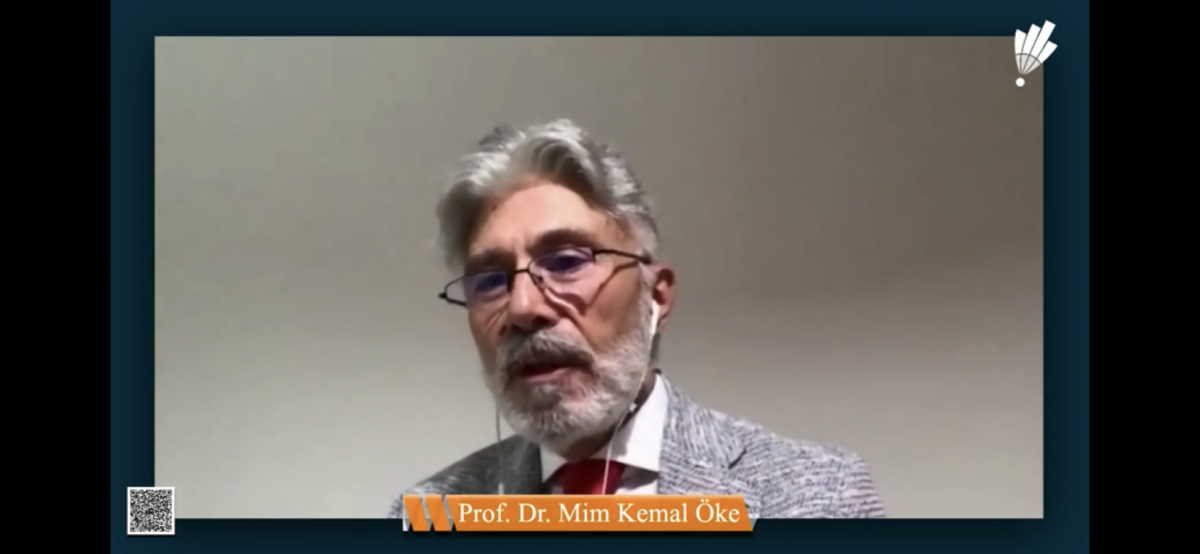 Professor Dr. Mim Kemal Öke also touched upon the connection between reed flute and love in Sufism: Rumi tells us to listen to the nay, the reed flute... Because the nay is the perfect human being; it is indeed Rumi himself. It was very beautiful, actually, going all the way to Gilgamesh. Maybe its mythology goes back to King Midas. It has been reinterpreted in various cultures. It finds its most meaningful definition in Rumi's words. When Rumi asks us to listen to the nay, it means a lot. It is actually a reed flute... It takes you out to the nature; you come to the realm. When you arrive at the realm, you feel the breath of the Supreme God. You see the reeds in the wind; Oh God, those reeds start swaying and bending in the wind. When they swing, it makes you remember that great verse in the Qur'an: Everything in the heavens and the earth glorifies Allah, but you do not understand their glorification. Reeds start swinging and, seeing this, the nightingale starts singing; roses starts blossoming and, before you know it, there you have a universe of lovers. It is not a universe, a table of lovers, indeed. Then man asks himself, why do I stand here then? And says you, the reed, you reveal the secrets you were confided in. We will cut you down. They abruptly cut it out. First, they dry it. So, as Rumi says, first it needs to be burnt. As in his saying: "I was raw, I was cooked, and I was burnt." First, they burn and dry.
Professor Dr. Mim Kemal Öke also touched upon the connection between reed flute and love in Sufism: Rumi tells us to listen to the nay, the reed flute... Because the nay is the perfect human being; it is indeed Rumi himself. It was very beautiful, actually, going all the way to Gilgamesh. Maybe its mythology goes back to King Midas. It has been reinterpreted in various cultures. It finds its most meaningful definition in Rumi's words. When Rumi asks us to listen to the nay, it means a lot. It is actually a reed flute... It takes you out to the nature; you come to the realm. When you arrive at the realm, you feel the breath of the Supreme God. You see the reeds in the wind; Oh God, those reeds start swaying and bending in the wind. When they swing, it makes you remember that great verse in the Qur'an: Everything in the heavens and the earth glorifies Allah, but you do not understand their glorification. Reeds start swinging and, seeing this, the nightingale starts singing; roses starts blossoming and, before you know it, there you have a universe of lovers. It is not a universe, a table of lovers, indeed. Then man asks himself, why do I stand here then? And says you, the reed, you reveal the secrets you were confided in. We will cut you down. They abruptly cut it out. First, they dry it. So, as Rumi says, first it needs to be burnt. As in his saying: "I was raw, I was cooked, and I was burnt." First, they burn and dry.
THE PATH TO COMPANIONSHIP IS BASED ON LOVE
Regarding Professor Ateş' question about how people would today switch to an understanding of seeing each other as a companion rather than a competitor, Professor Dr. Öke replied as follows:
"If a person makes his ego surrender to his soul... I wonder, does man evolve toward perfection in this case? When God wants you to be a servant, God does not mean a such slavery in the style that white man goes to Africa, chains the natives and puts fetters on their feet of; and then, carries them to America by ships and puts them to work on plantations. What we mean here is that, you know, we say to Allah Almighty "let me be your servant or slave", when in the face of anything beautiful. This can also be seen in Turkish art music. In other words, "let me be your servant or slave with all my feelings from the bottom of my heart." I mean, you direct all your love to Allah. Sometimes such a figure of god that is completely based on fear is drawn. It is also supported by mythology. In our culture, what would you do but not love such a God who created human beings so that wanted to be known and loved; and for this, called his prophet Habibullah meaning loved by Allah; and sent those following the sainthood of the Prophet, such as Yunus Emre and Rumi, to the world so that they could tell people this message of love and maintain it by taking it all over the world. Indeed, brother! What would you do but not love such a god? Asking for God's sake, as we say it in Turkish for the love of Allah."

